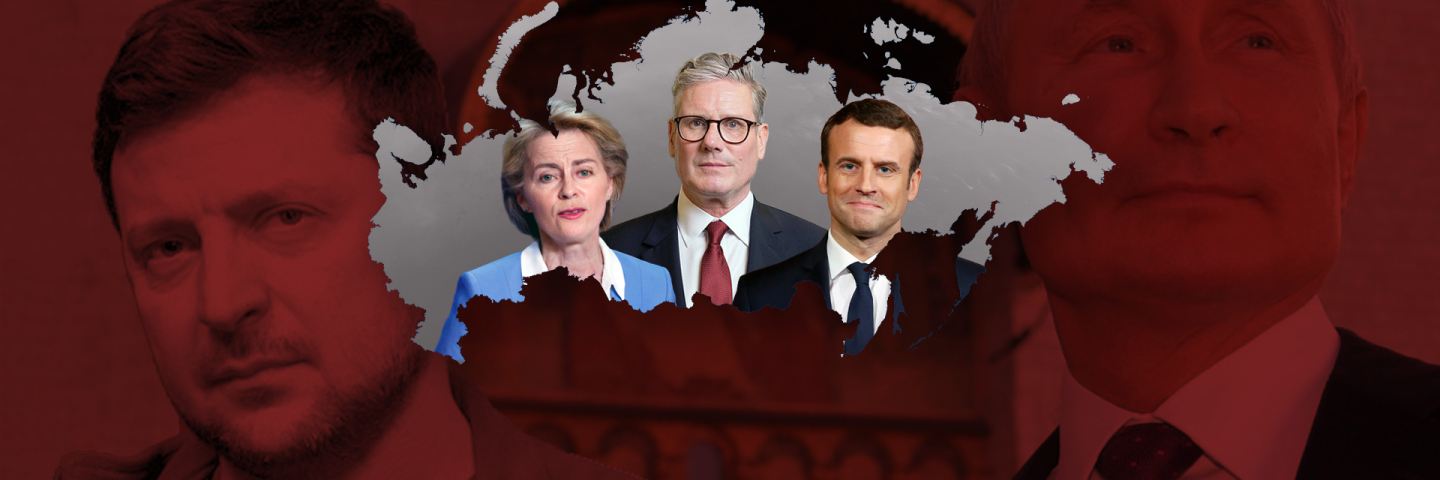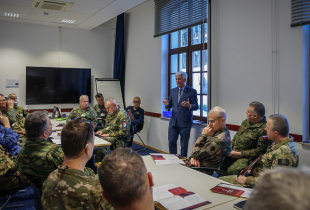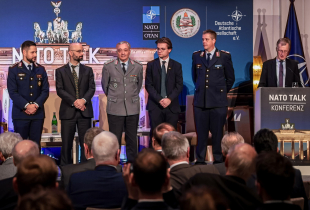
Russia’s End State: Russia and Transatlantic Relations
This report is a summary of the George C. Marshall European Center for Security Studies (GCMC)’s fifth Strategic Competition Seminar Series (SCSS) virtual seminar for fiscal year 2025 (October 2024 to September 2025). On January 21, 2025, with the Chatham House Rule in operation, 42 individuals, including desk officers from the US Department of Defense, Germany’s Federal Ministry of Defense, GCMC alumni and faculty, other subject matter experts, and presenters Pavel Baev, Mark Galeotti, and Dmitry Gorenburg discussed how the new US Trump administration will likely engage Russia, particularly regarding peace negotiations with Ukraine, and how transatlantic relations may evolve. This summary includes insights shared by the presenter and points that emerged from the discussion. It is intended as an aide memoire of the event for the participants and as means of sharing key points and insights with a wider readership.
Introduction
US President Donald J. Trump’s January 20, 2025 inaugural address contained a mixed message regarding US global engagement. At the beginning of the speech, Trump stated, “We will not allow ourselves to be taken advantage of any longer. During every single day of the Trump administration, I will very simply put America first.” His address concluded with a different message, however: “We will be a nation like no other, full of compassion, courage, and exceptionalism. Our power will stop all wars, bring a new spirit of unity to a world that has been angry, violent and totally unpredictable.” Following his inaugural address, Trump noted, “‘He [Putin] should make a deal. I think he’s destroying Russia by not making a deal.’ . . . Russia is ‘going to be in big trouble.’ . . . ‘Most people thought that war would have been over in one week. He can’t be thrilled, he’s not doing so well.’ . . . ‘Russia is bigger, they have more soldiers to lose, but that’s no way to run a country.’”
Is the Trump administration willing to expend long-term political capital to achieve a sustainable peace with Russia, or will it prioritize achieving a ceasefire in Ukraine in the short term? In terms of the Kremlin’s prior expectations, hopes, and opportunities concerning the Trump administration, are these being realized? Can Russia manage public expectations and avoid potential risks associated with Trump? What of Ukraine’s preferences? Can Kyiv gain traction with the new administration?
Trump’s Ambitions: Their Impact on Ukraine
For Trump the “peacemaker and unifier,” immediate priorities are primarily domestic—the southern border and immigration. China looms largest in foreign policy priorities; Russia, less so. But peace-for-territory negotiations, with Europeans taking a bigger stake in maintaining continental security under the notion of better burden sharing, allows the United States to undertake burden shifting and focus on China. As is the case with elected leaders, Trump is at the peak of his capabilities, political resources, and authority at the start of his second term. If “personnel is policy,” then the new Trump administration has a range of opinions and no consistent policy line, increasing the potential for disagreement. Newly confirmed Defense Secretary Peter Hegseth and nominated but yet to be confirmed Director of National Intelligence Tulsi Gabbard are considered more isolationist. National Security Advisor Mike Waltz, Secretary of State Marco Rubio, and Trump’s special envoy for Ukraine, Keith Kellogg (former US Army lieutenant general and senior adviser to former Vice President Mike Pence) are more traditional Republicans in that they support Ukraine’s armament but note that both Russia and Ukraine would have to make concessions to end the war. This suggests Ukraine’s goal of reclaiming occupied territories, including Crimea, is unrealistic.
In November 2024, the Wall Street Journal leaked a set of negotiating ideas and proposals from President Elect Trump’s team designed to incentivize Russia and Ukraine to accept a ceasefire. Within a nominal 100-day timeline from inauguration, these points included: “freezing the war in place—cementing Russia’s seizure of roughly 20% of Ukraine—and forcing Ukraine to temporarily [20 years] suspend its quest to join [NATO].” The proposals also included one that would have Ukraine agree to de facto, but not de jure, cede “occupied territories” to Russia. Security guarantees for Ukraine were vague but did include establishing a demilitarized zone with European peacekeepers and continued (potentially even increased) US arms deliveries to Ukraine to incentivize Russia to negotiate, partially lifting sanctions if it were to do so.
Putin's Demands: New Territories and NATO Exclusion
Three years in, the war has become the organizing and stabilizing logic of Putin’s regime, justifying Putin’s imperial policy choices and legitimizing his personalistic quarter-century rule. Perpetual conflict is sustained by a war economy, with war-related wealth transfers tying the elite to Russia’s messianic mission and to military-patriotic mobilization. This domestic transformation is mirrored in Russia’s foreign policy, as it has deepened strategic partnerships with China, North Korea, and Iran—a partnership treaty with a collective “defense cooperation” clause, was signed on January 17, 2025—actions that aim to sustain Russia’s warfighting, avoid sanctions, and weaken the West. Putin’s bedrock goal of defeating Ukraine remains. Russia’s theory of victory rested on first destroying Ukraine’s territorial integrity and sovereignty–statehood—by force.
Yet outside the Kremlin’s “Vladimir the Victor” information bubble, Russia looks weaker. Since 2022, Moscow has conceded positions in Karabakh, Armenia, Moldova, Syria, and the Sahel. Israel, South Korea, Azerbaijan, and Türkiye all have increased support for Ukraine. In addition, Ukraine’s renewed offensive in Kursk visibly undermines the global perception that Russia has strong deterence capabilities and is a military superpower. Russia’s so-called “inexhaustible resources” that enable Russia to wage a full-scale war are becoming exhausted. Not only would a Russian victory in Ukraine constitute a long-term drain on Russian resources, but Putin lacks a strategy to attain it. Recent polls in Russia suggest a majority favor peace talks, as Russians embrace Russian patriotic-nationalist rather than Putin’s imperial-nationalist discourse: “why spend money on Mariupol? Better to spend it here in Russia.” Notably, three-quarters of those polled would also accept any peace deal Putin signs. Putin’s signature becomes the alibi. Of course, Ukraine is also suffering, and a majority there, too, favors peace talks, with a growing minority willing to accept territorial concessions as the price for peace.
Putin’s stance is full of cognitive contradictions: Russia has “parameters for peace” (i.e., “conditions”) for “negotiations without preconditions” and claims to want “a long-term durable peace, backed up with guarantees for the Russian Federation and its citizens” but not to halt the fighting. Presidential Aide Nikolai Patrushev asserts that Ukraine will cease to exist as a state in 2025, hardly a conducive starting point for negotiations. Putin’s core rationale for war—preventing Ukraine’s future NATO membership—became unintended collateral damage when Russia announced it had “no problem” with nonaligned Sweden and Finland joining NATO, even though Finland’s accession doubled NATO borders with Russia and Sweden’s turned the Baltic Sea into a NATO lake.
Russia has highlighted the “denazification” and “demilitarization” of Ukraine. Furthermore, in June 2024, Putin identified more specific demands for peace negotiations. These included: 1) Ukraine must fully withdraw its forces from the Donetsk, Luhansk, Zaporizhzhia, and Kherson regions to their administrative borders; 2) Kyiv must officially abandon its NATO membership aspirations (NATO membership is enshrined in Ukraine’s constitution); 3) the status of Crimea, Sevastopol and other annexed territories in eastern Ukraine as Russia must be recognized in international treaties; and, 4) sanctions against Russia must be lifted. Subsequently, Putin has said that negotiations would only begin when the Kursk region was retaken. It is likely that Putin plans attritional war and protracted negotiations to run in parallel, and to what extent his claimed demands are more than negotiation positions remains to be seen.
Coming into the second Trump presidency, the Kremlin envisions several actions the Trump administration could take to benefit Russia, although on further consideration, most will likely be stumbling blocks instead. First, Trump could escalate tensions with China, leaving the United States with fewer resources and energy to focus on Russia. However, China’s vice president attended the inauguration, and Trump plans to meet with President Xi Jinping, suggesting outstanding disagreements may be addressed and tensions reduced, even though the US president has since restated his threat of imposing import tariffs. The Putin-Xi phone call on the eve of Trump’s inauguration only underscored their stagnating economic relations. Second, Trump was expected to face myriad challenges in the Middle East; instead, the Gaza ceasefire and hostage exchange favors stability. Additionally, while Russia’s recently signed but watered-down strategic partnership with Iran, which may become a target of maximum pressure by the new US administration, brings risks rather than compensating for the loss of Assad and Syria.
Third, by virtue of the fact that tightened US sanctions on the Russian energy sector and its “shadow fleet” were enacted by the Biden administration, Russia hoped that Trump would rescind them. This has not happened. Fourth, extrapolating forward from first-term trends, Russia expected a gulf to emerge between the Trump and Zelenskyy administrations. Instead, Russia’s mantra of “no ceasefire, peace on Russia’s terms” directly contradicts the Trump administration’s “ceasefire now, no peace on Russian terms.” Lastly, as the United States withdraws from the World Trade Organization and Paris Charter, and the new administration talks of European tariffs and of annexing Greenland and the Panama Canal, Russia expects Trump, “the disruptor-in-chief,” to translate US-EU policy divergences and tensions within NATO into a transatlantic strategic divorce. While Russia’s first four sets of expectations have not yet materialized, Russia hopes this fifth element might still prove transformational for Russian prospects.
Ukraine’s Expectations: Sustainable Peace and Credible Security Guarantees
Ukraine’s goal is to obtain security guarantees and to end the war with Russia in 2025. On October 16, 2024, President Volodymyr Zelenskyy outlined Kyiv’s negotiation stance in his “Victory Plan.” The elements include 1) a formal invitation for Ukraine to join NATO; 2) strengthening defense capabilities and creating a system of non-nuclear deterrence against Russia; 3) attracting Western investors to Ukraine while increasing sanctions on Russia; and, 4) in the post-war period, deploying Ukrainian troops in Europe to reduce reliance on US forces. This package is compatible with a “West Germany” model, and it contains elements of the South Korea model, but challenges abound.
First, while NATO membership would represent an unambiguous defeat for Putin, the Trump administration has more or less ruled this out. And in any case, the process of NATO membership is slow, needing the approval of 32 parliaments, and subject to consensus with national vetoes in play. Second, for Ukraine, the return of Crimea is critical to its future Black Sea trade and links to global markets that will ensure its economic viability as an independent state. The continuity of de facto Russian control of a militarized Crimea undercuts this future.
Third, if current front lines are frozen, a demilitarized zone (DMZ) would need to be established, with European troops potentially acting as peacekeepers. Such peacekeepers could serve as a deterrent for a renewed Russian attack and help Ukraine’s manpower problem. Moreover, such boots on the ground would signal to the Trump administration that Europeans are willing to accept more costs and risks and, as such, should get a seat at the negotiation table. As Zelenskyy noted at Davos: “Europe deserves to be more than just a bystander, with its leaders reduced to posting on X after an agreement has already been made. Europe needs to shape the terms of those deals.” Third-party NATO member state adjudicators, inevitably opposed by Russia, should trigger enforcement of DMZ breaches, but what costs can credibly be imposed on Russia? In short, what deters further Russian aggression against Ukraine?
From a Ukrainian perspective, presenters asked, if ceasefire and peace negotiations were to result in the following—Russia retaining Ukrainian territory seized by force; sanctions against Russia being lifted; the de facto creation of a demilitarized buffer zone; and Ukraine rendered neutral rather than in NATO and in possession of security assurances not watertight guarantees—then would it be the case that Russia receives everything and Ukraine receives nothing? Moreover, Putin is able to break a ceasefire at his time and choosing and so has the strategic initiative.
The presenters noted that Ukraine could benefit from a ceasefire because it would save lives and the further loss of territory, and its military could rotate, train, and re-equip and rearm, thus strengthening ties with the West. Unlike Russia, which will still be sanctioned, Ukraine could use a ceasefire pause to rebuild its economy, including its defense industrial complex, return refugees, and bring back normalcy to politics. For Russia, if war is the glue that holds society and elites together, the end of war is a gamble, exposing hidden vulnerabilities inherent in Putin’s hold on power.
Conclusion
After three long years of war, Ukraine clearly has demonstrated it can avoid defeat, through its resilience, will to fight, and vital western support. Russia has become more dependent on the support of Iran, North Korea, and China, as, over time, its redline diplomacy and deterrent credibility erodes. Europe has also had time to imagine both the consequences and costs of Ukraine’s defeat—a divided, demoralized, depopulated and anti-Western Ukraine under Russia tutelage—and Russian victory, with future fait accompli land grabs validated and nuclear proliferation incentivized. As retired US Army Lieutenant General and former US Army Europe Commander Ben Hodges observed, “defeating Russia is important to protect the things that we cared about ever since the end of the Second World War. Sovereignty, respect for international law, respect for human rights, freedom of navigation, the UN Charter.”
Trump wants quick wins, but he realizes ceasefire and peace negotiations are complex. Putin will seek to stress-test US credibility, and his excessive maximalist demands are a negotiation tactic. In an era of personalistic politics, Putin could overplay his hand by insulting an unpredictable Trump, leading the administration to invest more time and resources in the negotiations process while bolstering Ukraine’s defenses. The possibility of ending fighting by Spring 2025 is the highest since March 2022 (Istanbul Talks) and could be quantified at 30 percent. Ultimately, the hope is that Ukraine’s future strategic status will reflect the new “transatlantic bargain” and, by extension, signal a US burden shifting to the Indo-Pacific region, rather than Russia realizing its dystopian imperial dreams.
GCMC, Garmisch-Partenkirchen, January 27, 2025.
About the Contributors
Dr. Pavel K. Baev is Research Professor at the Peace Research Institute Oslo (PRIO). He is also a Senior Non-Resident Scholar at the Brookings Institution (Washington, D.C.) and a Senior Research Associate with the French International Affairs Institute (IFRI, Paris). Dr. Baev specializes in Russian military reform, Russian conflict management in the Caucasus and Central Asia, energy interests in Russia’s foreign policy, and Russian relations with Europe and NATO.
Dr. Mark Galeotti is Director of the London-based consultancy Mayak Intelligence, an honorary professor at the University College London School of Slavonic and East European Studies, a senior associate fellow at the Royal United Services Institute, and a senior non-resident fellow at the Institute of International Relations Prague. He is an expert and prolific author on transnational crime and Russian security affairs. His latest books include: Putin’s Wars, from Chechnya to Ukraine (London: Osprey, 2022); The Weaponisation of Everything: A Field Guide to the New Way of War, 2022 (New Haven and London: Yale University Press, 2022).
Dr. Dmitry Gorenburg is Senior Research Scientist in the Strategy, Policy, Plans, and Programs division of the Center for Naval Analysis, where he has worked since 2000. Dr. Gorenburg is an associate at the Harvard University Davis Center for Russian and Eurasian Studies and previously served as Executive Director of the American Association of the Advancement of Slavic Studies (AAASS). His research interests include security issues in the former Soviet Union, Russian military reform, Russian foreign policy, and ethnic politics and identity. He currently serves as the editor of Problems of Post-Communism.
Dr. Graeme P. Herd is a professor of Transnational Security Studies in the Research and Policy Analysis Department at the George C. Marshall European Center for Security Studies. His latest books include Understanding Russia’s Strategic Behavior: Imperial Strategic Culture and Putin’s Operational Code (London and New York, Routledge, 2022) and Russia’s Global Reach: A Security and Statecraft Assessment, ed. Graeme P. Herd (Garmisch-Partenkirchen: George C. Marshall European Center for Security Studies, 2021).
The George C. Marshall European Center for Security Studies in Garmisch-Partenkirchen, Germany is a German-American partnership and trusted global network promoting common values and advancing collaborative geostrategic solutions. The Marshall Center’s mission to educate, engage, and empower security partners to collectively affect regional, transnational, and global challenges is achieved through programs designed to promote peaceful, whole of government approaches to address today’s most pressing security challenges. Since its creation in 1992, the Marshall Center’s alumni network has grown to include over 16,000 professionals from 157 countries. More information on the Marshall Center can be found online at www.marshallcenter.org.
The Clock Tower Security Series provides short summaries of Seminar Series hosted by the George C. Marshall European Center for Security Studies. These summaries capture key analytical points from the events and serve as a useful tool for policy makers, practitioners, and academics.
The articles in the The Clock Tower Security Series reflects the views of the authors and are not necessarily the official policy of the United States, Germany, or any other governments.

